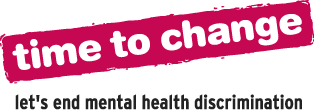I'm tired of talking. What I want now is change.
I guess it isn't Time To Change's fault. I mean the logo says 'let's end mental health discrimination." It doesn't say 'lets improve mental health services'. Or 'Time to change mental health services" or "Time to hold mental health services/government/god to account". And I am also conscious that to take this campaign for my own ends, my own argument is to fail to recognise that stigma does still exist that it does still cause harm, that people are still afraid to talk, to get help and that this still kills. But I am not denying that 13 years after the campaign began and days like today, weeks like mental health awareness week, and months like mental health awareness month we still have a lot to do.
And in the absence of any particular day to make my case I will choose today. And in keeping with it being 13 years since the launch of Time To Change (according to google), here are 13 things that I think we need to talk about. We need to change. All of us. If not today. Tomorrow. And we need to keep talking. And demand that somebody listens...
1) We need to talk about the reality that when you are ready to talk, mental health services might not be ready to listen - expect waiting lists. Lots of them. If possible, try and plan your break down for about 2 years after you first get referred. It should work out okay that way.
2) We talk about reducing the mortality gap between those with serious mental illness and those without. The five year forward view for mental health promised annual physical health checks for those in primary care with the GP. They are fulling woefully short.
3) If we are really striving for parity of esteem between mental health and physical health, then why is 14.1 % of local health spend acceptable? And how can 97% of CCGs be meeting their targets if this is so?
4) The failure that is IAPT: a quarter of those referred do not 'engage' with the telephone assessment at all, a third drop out during the course of treatment. Of those that do actually complete it, half achieve recovery, promising in itself, but less headline worthy when you consider that this is 19% of those referred. Oh and back to waiting lists, 75% should start treatment within 6 weeks of referral the reality is that half wait over 28 days, one in six longer than three months - if you ask for this service be prepared to be in limbo
https://www.bacp.co.uk/news/news-from-bacp/2019/5-december-long-waiting-times-for-iapt-unacceptable/
5) The reality that more than 2000 people are quitting working in mental health services every month. Services are seriously understaffed. Unable to cope with increasing demands. At times unable to keep people safe. We (as a profession) often have too much work to do, with too little time, and too little support and something has to give. The loss of the bursary is only going to make this situation worse (See https://www.theguardian.com/society/2018/sep/15/nhs-mental-health-crisis-staff-quit)
6) That despite anorexia having the highest mortality rate of all mental illnesses, people are still being told that they are 'not thin enough' to start treatment (https://inews.co.uk/news/health/anorexia-treatment-weight-259400)
7) The disproportionate representation of black asian minority ethnics, in both the criminal justice system https://assets.publishing.service.gov.uk/government/uploads/system/uploads/attachment_data/file/639261/bame-disproportionality-in-the-cjs.pdf and in inpatient mental health. A black person is more likely to be detained, more likely to be secluded, more likely to be restrained and more likely to be diagnosed with psychosis. That we are not doing enough to understand why. Or what we can do about it.
8) Whilst on the subject of minority groups. A person from the LGBTQ community is more likely to take illicit substances. To experience depression. To attempt suicide. To experience discrimination from mental health services who assume that the needs of those from the LGBQT community are the same as those of heterosexual individuals. These populations have unique concerns, and some issues a greater prevalence in these communities. We need equity for these groups. Not equality.
9) Those with serious mental illness are more likely to engage in high risk sexual behaviours, the prevalence of unplanned pregnancy, human immunodeficiency virus, hepatitis, and all other sexually transmitted infections is higher in this populations, as is the rate of being victimised by domestic and sexual violence, and yet in the year 2020 we still shy away from conversations about sexual health.
10) The continued stigmatisation and misrepresentation of emotionally unstable personality disorder/ borderline personality disorder. The link with trauma – particularly physical and sexual abuse – has been studied extensively and is near-ubiquitous in patients with BPD. Yet it is seen as a problem with the person. Their personality. And too often, they become 'the problem'. Too often clinicians see these individuals as manipulative, unwilling to help themselves, hard to deal with or undeserving of care. 75% of BPD patients attempt suicide at some point in their life. One in ten eventually take their own life. This is the reality and the tragedy.
11) The continued failing of our children with mental health difficulties. As with eating disorder services, our kids, our future, are often being told that their condition is not 'severe' enough for them to get help. Just 3 in 10 young people get the treatment that they may need; meaning that 7/10 risk getting to crisis point. https://practicebusiness.co.uk/nhs-is-failing-children-with-mental-health-issues-pac-report-shows/
12) The 'hostile environment' for those with mental illness caused by the department of work and pensions. This is literally a matter of life and death. Both a national tragedy and shame:
- 62% of people that the DWP sanctions live with mental health issues.
- At least 590 people have taken their own life due, in part, to DWP fit-for-work tests
13) That I found it quite easy to sit here and think of 12 things that we need to talk about. That there are probably hundreds. That this is why we do not need another time to talk day. We need change. We need action. If not today why not tomorrow?


Comments
Post a Comment